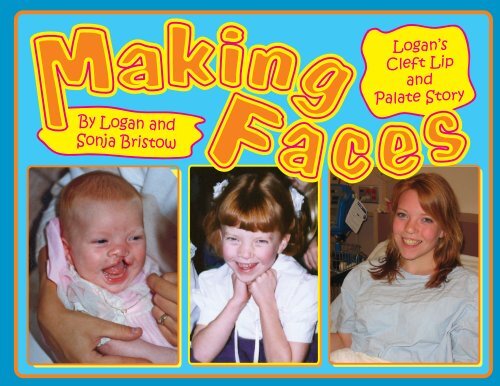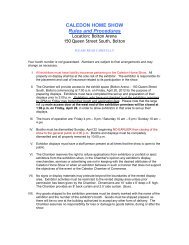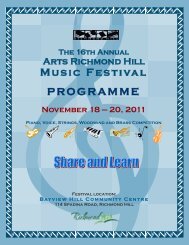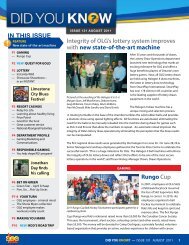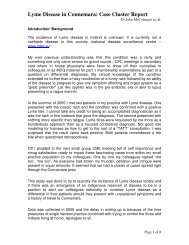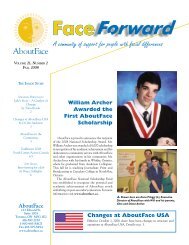By Logan and Sonja Bristow - Bridgelin
By Logan and Sonja Bristow - Bridgelin
By Logan and Sonja Bristow - Bridgelin
Create successful ePaper yourself
Turn your PDF publications into a flip-book with our unique Google optimized e-Paper software.
<strong>By</strong> <strong>Logan</strong> <strong>and</strong><br />
<strong>Sonja</strong> <strong>Bristow</strong><br />
<strong>Logan</strong>’s<br />
Cleft Lip<br />
<strong>and</strong><br />
Palate Story<br />
��� �
Baby <strong>Logan</strong> born July 23, 1988<br />
8 lbs 6 oz<br />
It was a hot day in July, <strong>and</strong> after a normal<br />
pregnancy <strong>and</strong> a quick five-hour delivery,<br />
I was born at St Paul’s Hospital in<br />
Vancouver, British Columbia!
I love my<br />
mummy!<br />
My sweet<br />
baby!<br />
My mom tried hard<br />
to nurse me, but I<br />
couldn’t suck well<br />
enough. My mom<br />
pumped breast milk<br />
to feed me, but I<br />
had a difficult time<br />
<strong>and</strong> found that I<br />
could drink formula<br />
more easily because<br />
it was thick!
Eating<br />
is hard<br />
work!<br />
At first, every waking<br />
moment was a feeding<br />
moment!<br />
I had to learn to use<br />
a special cross-hatch<br />
nipple to drink my<br />
milk because I had<br />
no suction with my<br />
cleft palate. I lost a<br />
lot of weight before I<br />
caught on! The bottle<br />
was soft <strong>and</strong> my parents<br />
helped me by<br />
squeezing it gently.<br />
I had a great trick<br />
of shooting milk out<br />
of my nose when I<br />
choked or sneezed!
�<br />
After lip surgery...<br />
You’ll be<br />
hearing<br />
from my lawyer!<br />
Surgery was hardest on my mom. After my lip surgery, I had to<br />
wear splints on my arms so that I wouldn’t rub at the stitches.<br />
The splints were made of tongue-depressors! My hospital stay<br />
was for two nights, but some kids stay only one night.
There can be a lot of different specialists that make up the<br />
building blocks of a team. These are just some of them:<br />
Audiologist<br />
Nurse<br />
Oral Surgeon<br />
Orthodontist<br />
Pediatrician<br />
Pedodontist<br />
Plastic Surgeon<br />
Speech-language Pathologist<br />
Evaluates your child’s hearing from infancy.<br />
Monitors health. Provides support for anxious<br />
parents. Offers skilled caring.<br />
Performs palate <strong>and</strong> bone graft surgery.<br />
Monitors facial growth <strong>and</strong> development<br />
<strong>and</strong> braces.<br />
Monitors health, growth <strong>and</strong> maturation.<br />
Children’s dental specialist. Dental care<br />
is so important!<br />
Performs lip <strong>and</strong> nose surgery.<br />
Assesses speech development.<br />
Cleft lip <strong>and</strong> palate children will undergo a thorough evaluation by many of the team specialists. The assessment<br />
may take place in one long day or over several days on an outpatient basis. The team members then meet <strong>and</strong><br />
discuss all aspects of the child’s condition <strong>and</strong> make recommendations regarding treatment.
Hi, <strong>Logan</strong>!<br />
I’m Dr Rosen.<br />
I’m your<br />
anesthetist.<br />
The next doctor to come in is<br />
Dr Rosen. He is my anesthetist.<br />
He tells me all about what is going<br />
to happen in the operating room.<br />
He explains the IV <strong>and</strong> how I will<br />
fall asleep. I am kind of scared.<br />
…my an..<br />
eestha…<br />
whatt!!?<br />
An anesthetist<br />
is a special doctor<br />
who gives the<br />
drugs that put<br />
you to sleep<br />
before your<br />
operation.
<strong>Logan</strong>’s<br />
dental x-ray<br />
Welcome to the<br />
operating room.<br />
We’re glad you<br />
didn’t get lost<br />
getting here!<br />
Here<br />
I go!<br />
Dr Rosen is already here waiting for me <strong>and</strong> so are the others who<br />
will be helping. Dr MacDonald is my surgeon <strong>and</strong> he will be here<br />
soon. My mom takes pictures with her camera until it is time for me<br />
to be put to sleep for my operation. I blow soap bubbles while they<br />
put in my IV <strong>and</strong> I don’t feel a thing! I lie down <strong>and</strong> hold my mom’s<br />
h<strong>and</strong> as they put in the anesthetic. Sometimes they get you to<br />
count backwards from 20, but I’m already…..ZZZZZZZZZZ!!!!!
Tadah!<br />
I’m all done<br />
(for a while).<br />
I feel really good when I smile! After all the surgeries<br />
I’ve had, I totally think it’s worth it! I like the way I look<br />
(except sometimes when I get up in the morning, I look<br />
kind of scary).
I have some growing up to do.<br />
When my baby tooth falls out,<br />
I will have a space that will<br />
need to be kept open for an<br />
eventual false tooth. When I’m<br />
18, I will get a tooth implant.<br />
So here I am in all my glory!<br />
It’s now a waiting game until<br />
my braces come off, <strong>and</strong><br />
I suppose there is<br />
rhinoplasty (a nose job)<br />
in a few years.
Before …<br />
I am pretty laid-back<br />
about this surgery.<br />
The changes will be<br />
relatively minor. There<br />
will be swelling <strong>and</strong><br />
discolouration, but<br />
I can h<strong>and</strong>le that!<br />
Ready <strong>and</strong> waiting …<br />
reading outdated<br />
magazines <strong>and</strong> trying<br />
to envision my “after.”<br />
… after
<strong>Logan</strong> <strong>and</strong> her<br />
technicolour face<br />
I feel terrible.<br />
I can’t believe<br />
I went into this<br />
so positively!<br />
Dr Son-Hing removes<br />
my nose splint<br />
I am experiencing a lot of swelling <strong>and</strong> I am nauseated from the<br />
anesthetic. I have my splint on for 5 days <strong>and</strong> then it is removed.<br />
This is not a pleasant experience! I am having a hard time shaking<br />
the anesthetic <strong>and</strong> this makes my recovery rocky. I feel gross!
Helping a CHild prepare For a Hospital stay:<br />
WHat parents Can do<br />
Having a child hospitalized can be unsettling for the whole family. There are things that parents can do that will make the experience<br />
easier for the child, siblings, other family members <strong>and</strong> parents, too! Here are a few tips that families have found helpful.<br />
Preparing Yourself<br />
A prepared parent is best able to prepare <strong>and</strong> support a child through a hospital experience. Find out all you can about the particular<br />
hospital’s routines <strong>and</strong> procedures before your child is admitted. Ask if there is a hospital guidebook for parents <strong>and</strong> children. The<br />
hospital’s public affairs department or patient representative’s office should be able to direct you to someone who can answer your<br />
questions. It is a good idea to make a list. Here are a few questions that most parents need to ask:<br />
1. What should I bring with me for my child? For me?<br />
2. Can I stay overnight?<br />
3. When can siblings, gr<strong>and</strong>parents <strong>and</strong> friends visit?<br />
4. Will there be times when I will be separated from my child? Why? For how long? Who will be with my child?<br />
5. How can I be involved in my child’s care? If I am unable to be at the hospital, can my child’s gr<strong>and</strong>mother, uncle or babysitter<br />
stay with my child?<br />
6. Where do we go when we first arrive at the hospital?<br />
Preparing Your Child<br />
Give your child a simple, honest explanation of the need for a hospital stay. The words you use will depend upon the age of the<br />
child. Try to include “to help you grow” or “to help you stay strong <strong>and</strong> healthy” or “to help that part of your body do its job” in your<br />
explanation. Children younger than 6 years of age should be told about a hospital stay a few days in advance. Older children should<br />
be informed 1 to 2 weeks ahead of time.<br />
Encourage your child to talk about going to the hospital. Answer questions honestly, being careful to answer only what is being<br />
asked. If you are unsure, tell your child that you will write down that question <strong>and</strong> find the answer for him.<br />
Check to see if the hospital offers a program to prepare your child for hospitalization. If there is one, try to have the whole family<br />
attend. Take your questions with you!<br />
Talk to your child about getting ready to go to the hospital. Favourite pajamas, stuffed toys, blanket, books <strong>and</strong> family pictures<br />
can all be taken along.
Once you know about the routines of your particular hospital, books can be helpful in preparing your child for a hospital stay.<br />
Because it is important for you to be able to point out things in the book that may be different from what your child may experience,<br />
read the book yourself before reading it with your child. A toy medical kit can be used to encourage your child to show you what he<br />
thinks will happen to him when he goes into the hospital.<br />
Preparing Siblings <strong>and</strong> Other Family Members<br />
It is important that everyone in the family is included in preparing for a child’s hospital stay. Siblings will want to know why a brother<br />
or a sister <strong>and</strong> mom <strong>and</strong> dad will be away from home. Knowing who will be looking after them <strong>and</strong> how they can keep in touch with<br />
their parents <strong>and</strong> brother or sister helps siblings feel included. Phone calls, letters, homemade cards <strong>and</strong> pictures all help siblings<br />
stay in touch. If possible, arrange for siblings <strong>and</strong> other close family members to visit. Ask your child’s nurse to help you prepare<br />
brothers <strong>and</strong> sisters for what to expect when they come to visit at the hospital. It will be helpful for your children’s teachers to know<br />
that a child in the family is going to have a hospital stay. Cards <strong>and</strong> letters from classmates do wonders to cheer up a child in the<br />
hospital!<br />
Helping a child prepare for a hospital stay can be fun! You as a parent are your child’s most important source of support. Prepare<br />
yourself first <strong>and</strong> be sure to ask for help with the unpredictable questions that all children ask!<br />
Helping CHildren prepare For a Hospital stay or Visit:<br />
WHat parents HaVe done<br />
<strong>By</strong> Margaret, Texas<br />
Our seven-year-old son, Matthew, was born with bilateral porencephaly <strong>and</strong> hospitalized frequently in the early years. Although he is<br />
quite stable <strong>and</strong> progressing, there is still a multitude of follow-up medical visits every few months. Matthew learned a long time ago<br />
that a doctor’s office is unpleasant for him. He hated blood pressure cuffs <strong>and</strong> little flashlights, <strong>and</strong> going for a computed tomography<br />
(CT) scan of his head was a major ordeal. We have now progressed to the point where none of this bothers him anymore. This<br />
is what we did:<br />
Approximately one day before an examination, we would “rehearse”. We would wrap him in bath towels, “pad” his head with<br />
smaller towels to keep it immobile (just like the technicians do in radiology) <strong>and</strong> gently talk to him, reassuring him that the procedure<br />
would not hurt. We would put “floaties” (swim aids for children) on his arm <strong>and</strong> practice taking his blood pressure. Lying flat on the<br />
kitchen table to simulate the examination table was also helpful. If he didn’t like the game, we stopped <strong>and</strong> tried again later. Amazingly,<br />
he cooperated very well for a procedure that had been rehearsed.<br />
This is simple to try. Don’t expect a child’s anxiety to disappear overnight <strong>and</strong> remember that sometimes there are procedures that<br />
do hurt. However, young children can still learn that some examinations don’t hurt <strong>and</strong> it’s great when you can calm their fears.
About the Author:<br />
<strong>Logan</strong> <strong>Bristow</strong> is a Trinity<br />
Western University student<br />
who lives in Langley, BC.<br />
She is active with many interests<br />
such as: snowboarding, dancing,<br />
photography, scrapbooking,<br />
drawing, drama, working with<br />
kids, soccer, hiking, <strong>and</strong> hanging<br />
with friends. She is especially<br />
keen to share her cleft lip &<br />
palate experiences with others<br />
in the hopes that it can support<br />
<strong>and</strong> educate those facing the<br />
same journey.


